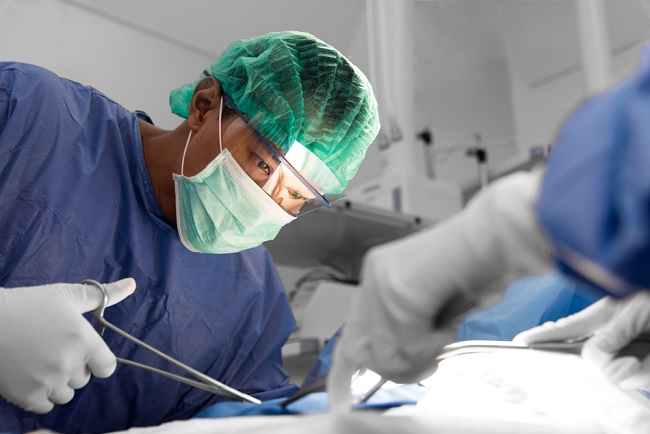Oral surgery is a surgical procedure performed to correct problems with the mouth, jaw, teeth, and lips. Not only that, oral surgery is also performed to treat conditions or diseases in the area around the teeth and mouth, such as disorders of the head and neck.
Oral surgery procedures are performed by dentists who specialize in oral surgery. This surgical procedure is often performed to treat various diseases or health conditions that cause problems with the function of the teeth, tongue, and mouth, such as difficulty swallowing, prolonged toothache, to more serious conditions, such as oral cancer.

Conditions Requiring Oral Surgery
The following are some health problems or diseases of the teeth and mouth that require oral surgery:
1. Tooth impaction
Tooth impaction is a condition when a tooth cannot grow due to lack of space in the jaw or the tooth grows in the wrong position. This condition mostly occurs in wisdom teeth, but can also occur in permanent teeth.
If not treated immediately, impacted teeth can increase the risk of tooth and gum damage, possibly even causing infection or tooth abscess.
To prevent this, dentists will generally recommend a wisdom tooth extraction procedure that has the potential to be impacted. If the impacted tooth has occurred and causes various health problems, this condition needs to be treated with an oral surgical procedure.
2. Jaw joint problems
Oral surgery can also be applied to treat various jaw complaints, such as jaw stiffness (locked jaw or unable to close), jaw pain, asymmetrical jaw shape, and headaches due to jaw disorders.
Jaw problems can occur due to uneven jaw growth or disorders of the temporomandibular joint, which is the joint that connects the jaw to the skull.
3. Fractures of the face and jaw
Oral surgery can also be performed to repair broken facial bones and jaws and cause problems with oral functions, such as speaking, swallowing, and chewing food.
Fractures of the face and jaw usually occur as a result of injury, for example from a blow or impact when falling from a high place, a traffic accident, or during extreme sports.
4. Cleft lip
Cleft lip conditions can interfere with the function of the mouth to eat and talk. In addition, cleft lip can also increase the risk of ear infections and dental problems. To overcome this, a dentist who specializes in oral surgery can perform oral surgery procedures.
5. Sleep apnea
Obstructive sleep apnea or sleep apnea is a chronic respiratory disorder that causes a person to experience difficulty breathing while sleeping. Sufferer sleep apnea may experience shortness of breath for some time while he is asleep, so his body may become deprived of oxygen.
This condition can be treated in several ways, including oral surgery. Oral surgical procedures on sleep apnea generally aims to widen the airway on the roof of the mouth and repair the tissues of the mouth and jawbone to widen the airway in the throat.
6. Tumor or oral cancer
Tumors or oral cancer can occur on the lips, inside of the cheeks, gums, roof of the mouth, tongue, or throat. Some tumors are benign, but some are malignant. Malignant tumors in the mouth is known as oral cancer.
Benign tumors in the mouth will usually cause lumps in the mouth. Meanwhile, oral cancer can trigger the appearance of canker sores that don't go away, lumps in the mouth, mouth pain or numbness, difficulty swallowing, and whitish patches appear in the mouth.
In addition to surgery or oral surgery, tumors or oral cancer can also be treated with chemotherapy and radiation therapy.
In addition to overcoming the various health problems above, oral surgery procedures can also be performed to install dental implants, which are procedures for replacing the root of a damaged tooth or tooth with artificial teeth that look and function like natural teeth.
Tips for Recovery After Oral Surgery
After undergoing oral surgery, you may experience bleeding, pain, and nausea and headaches due to the side effects of the anesthetic. Therefore, it is recommended that you get more rest and not do strenuous physical activity during the recovery period.
In addition, you are also advised to follow some of the following tips while recovering from post-oral surgery:
Biting on sterile gauze
To relieve bleeding, your doctor may ask you to bite on sterile gauze for 30–60 minutes. This can be done several times a day until the bleeding is reduced.
Give a cold compress to the mouth
The mouth and jaw area may experience swelling and pain after the oral surgery procedure is completed. To overcome these complaints, the doctor will advise you to apply a cold compress to the swollen area for a few minutes.
Stop brushing your teeth for a while
After you have had oral surgery, your doctor may also advise you not to brush your teeth or use mouthwash for a few days.
Alternatively, you can clean your mouth by gargling with warm water mixed with salt every 2 hours. Salt water gargling can also help wounds heal and prevent infection.
Take a special diet
During oral surgery recovery, you may be asked to eat foods with a soft, easily digestible texture, such as yogurt, porridge, and cereals. Avoid foods that are too hot, cold, hard, chewy, or spicy. This is to help the wound healing after surgery and prevent the wound from getting worse.
Don't smoke and don't drink drinks containing alcohol or soda
This is to prevent the surgical scar tissue from getting worse. In addition, you are also not advised to use straws, toothpicks, and spitting. Avoid doing this for at least 3 days after the oral surgery procedure.
Usually, you are allowed to start doing light physical activity within 2-3 days after recovery from oral surgery.
However, complaints of swelling, pain, and bleeding in the mouth usually only subside in about 7-10 days after oral surgery is performed. Therefore, you still need to consult again with your doctor after undergoing oral surgery so that the doctor can monitor your condition.
During the healing process you are advised to comply with all doctor's directions. In addition, you should also be alert and recognize serious signs or symptoms that may appear after undergoing oral surgery.
Immediately consult an oral surgeon if you experience bleeding that does not stop, fever, pus appears in the mouth, pain does not subside despite taking medication, numbness, and severe swelling in the mouth. To overcome these complaints, the oral surgeon will provide appropriate treatment.









